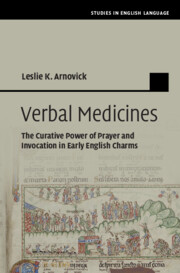Book contents
- Verbal Medicines
- Studies in English Language
- Verbal Medicines
- Copyright page
- Contents
- Figures
- Tables
- Introduction
- Chapter 1 Invoking Baptism
- Chapter 2 Psalm Charms as Aids against Illness
- Chapter 3 Invoking the Name of Mary
- Chapter 4 Invoking the Visitation of the Sick
- Chapter 5 The Multiplier Effect
- Chapter 6 Theoretical Implications
- Notes
- References
- Index
Chapter 4 - Invoking the Visitation of the Sick
Published online by Cambridge University Press: 29 November 2024
- Verbal Medicines
- Studies in English Language
- Verbal Medicines
- Copyright page
- Contents
- Figures
- Tables
- Introduction
- Chapter 1 Invoking Baptism
- Chapter 2 Psalm Charms as Aids against Illness
- Chapter 3 Invoking the Name of Mary
- Chapter 4 Invoking the Visitation of the Sick
- Chapter 5 The Multiplier Effect
- Chapter 6 Theoretical Implications
- Notes
- References
- Index
Summary
Early medieval charms invoke the service of the Visitation of the Sick through the use of liturgical elements central to that rite, as Chapter 4 argues. Charms import the singing of psalms, sprinkling of holy water, praying of anointing and healing formulas, imposing of hands, anointing of the body, and the chanting of antiphons and litanies. Once present in charms, these and other sacred practices serve as indices of the Visitation of the Sick. When allusions to the Visitatio Infirmorum are successfully recognized or evoked, charms invoke the liturgy. Because recognition proves crucial, the question of charm participants’ familiarity with the Visitation of the Sick leads us to assess the resonance of Visitatio references through the construct of a continuum. At one end we find charms containing references to the Visitation of the Sick that seem subtle in light of their brevity or context. At the opposite end we find charms with numerous, lengthy utterances based in the sacramental rite. Over all, associations with Christ’s healing and liturgical Unction are meant to transform faithful charm participants in their time of need.
Keywords
- Type
- Chapter
- Information
- Verbal MedicinesThe Curative Power of Prayer and Invocation in Early English Charms, pp. 151 - 196Publisher: Cambridge University PressPrint publication year: 2024

